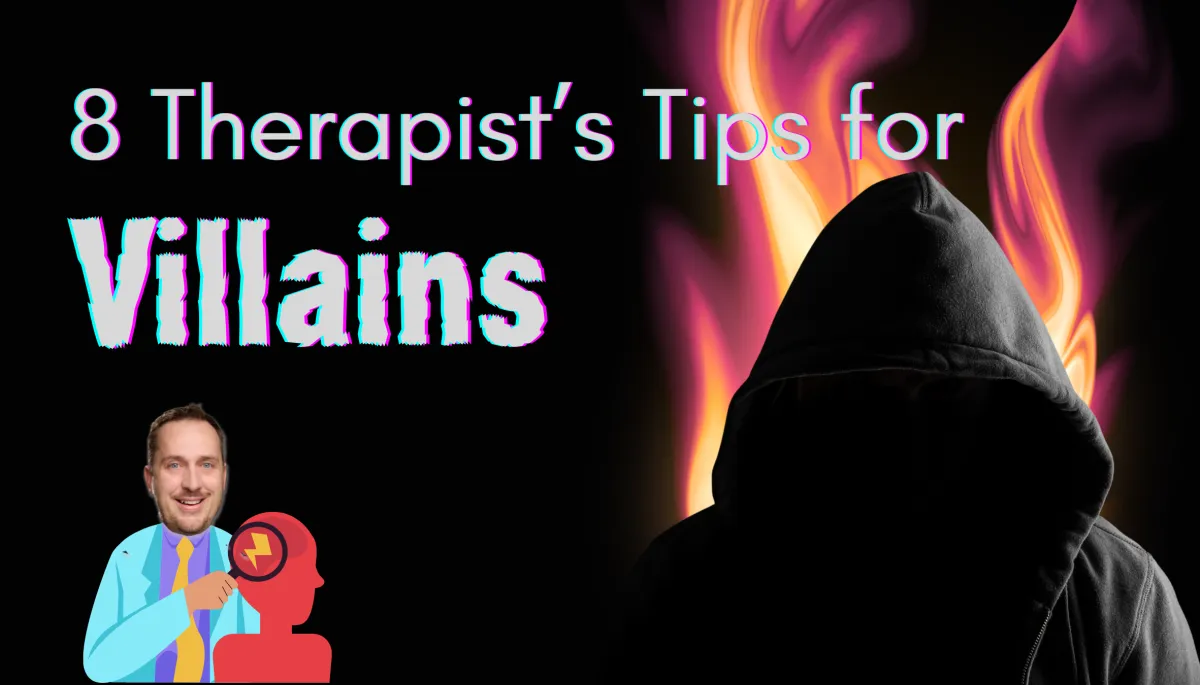General Inquiries: (587) 333-6349 - info@sanostate.com



Villain Therapy: Unconventional Guidance for the Misunderstood
“Never trust that the hero is dead.”
In a counselling session, a client told me about his early life of crime that he has long since abandoned and has actively worked hard to change. His stories were highlighted with Hollywood-esque tropes beginning at 10 years old, traveling across the city with a backpack, unknowingly filled with a million dollars worth of contraband. As he got older, other stories included high speed chases with over 50 police cars chasing him in his Toyota Corolla, being surrounded by the S.W.A.T. team, a corrupt prison guard, and smuggling of drugs in places far more creative (and disgusting) than a child's backpack.
I recognize that a certain level of non-judgment is required to provide proper care for some of my favourite clients. So, I have decided to curate some psychological tips for “villains”. Let's be clear here, I do not condone illegal or unethical behaviors. However, having done bad things does not preclude someone from needing and deserving some tips from a therapist.
So here they are:
Set Boundaries
Don't tell your nemesis your plan! It helps them to foil your plan. This is what we call boundaries. Safe boundaries can sometimes include limiting your divulging of sensitive information to safer spaces. Perhaps your plans might be better kept private, or perhaps you can discuss in the confidence of your next therapy session with a professional.
Considerate Conduct
When someone running from you falls over, don't walk towards them slowly while laughing. This is considered rude. Thinking of how your actions affect others can help you to build better rapport with others. Ask yourself, “might they be in a frightened state, and if so, how would I feel to see a threatening person approach me while laughing?”
Human Resource Tactics
In the hiring process, consider a standardized intelligence or personality test. Braun over brains is a strategy that has proven to be unsuccessful time and time again. Although there are some advantages to physical strength, this is a characteristic that is commonly NOT considered in most other job positions. As humanity becomes more and more civilized, we have found ways to overcome the need for physical strength in many situations. As such, placing more emphasis on attributes related to intelligence is a safer bet. Consider this: if you see them to be easy to control, this same trait that benefits you may benefit your opponent.
Breath of Restraint
Practice slow, deep breathing. This should happen when you consider killing someone out of anger or spite. Although some benefits might arise from killing someone, like sending a message to others about how serious you are about not being crossed, or encouraging others to not disappoint you. Murder is against the law, and in almost all cases it is highly unethical. It can also lower the number of allies you have. I recommended practicing a few slow breaths and then approaching the situation when feeling calmer.
Negotiation Know-How
Good communication, including compromises, can often be an easier way to achieve goals than alternatives. Remember, good guys will ALWAYS make a swap to save a soul, especially if it is a child. Yes, even if what they are giving you is a laser to destroy the whole planet, or the final missing piece of a map to the buried treasure. You also can have an advantage when the swap is being made with someone under extreme distress. This is what we call “cognitive load” and it makes it harder for them to make rational decisions, and easier to manipulate them.
Exercise Caution
Enter big battles with extreme caution. They always seem to be unfair to villains. Your allies are disabled the instant they are kicked or punched, no matter how hard. Good guys rarely die from being hit, and even when they do, it takes way longer for them to die. So statistically speaking, the odds are stacked against you in these situations. Think long and hard before engaging in a big battle.
Mindful of Emotion
When you get caught and taken to prison, or when things don’t go your way, always remember it is okay to express emotions that you may feel. Don't judge yourself for feeling sad or if you feel like crying. There are many emotions that can be felt, and it is okay to allow these emotions to process. Commonly we only see emotions being expressed by laughing maniacally or hitting things out of anger. Grant space to the other emotions as well.
Vigilance to Trusting
You might be very trusting, but this can be a common pitfall. For example:
Never trust that the hero is dead. Even if you see the hero's car blow up, or their house gets a million bullets shot at it. Especially if they are near a body of water, the hero can be very sneaky. They often need nothing more than an alcoholic drink, maybe a small bandage, and a one-night stand before returning to work.
Don't trust your hostage when they need to “go to the bathroom.” A large percentage of escapes happen under this guise.
If you need to "do someone in" taking them out back to do it increases their ability to escape, or find a way to counterattack.
Trusting others to do the job always carries risks. You may want to consider both their competency, as well as their motivations. Maybe they have different goals in life than you.
General Inquiries:
Our Locations:
Additional Resources:
About Us:
We strive for excellence in psychological treatment. We are committed to providing professional, caring, innovative, and research-based services.
© 2024 Sano State Taylored Psychology. All Rights Reserved.

